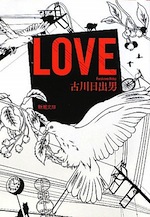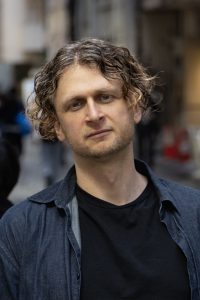
Five Great Genre-Bending Novels Set in Tokyo
For many writers, having the opportunity to live in the place their story is set can be a huge asset. Daily experiences become raw narrative material that can be refined to add texture and depth to the fictional world. I learned this firsthand when writing my debut novel, Cash Crash Jubilee, which takes place entirely in Tokyo.
 Since my imagined Tokyo was a near future, cyber-dystopian version of the present one, however, it wasn’t a simple matter of jotting down details from my life and feeding those into my prose. I had to transport my urban experiences forward in time, and recreate them as part of an alternate era.
Since my imagined Tokyo was a near future, cyber-dystopian version of the present one, however, it wasn’t a simple matter of jotting down details from my life and feeding those into my prose. I had to transport my urban experiences forward in time, and recreate them as part of an alternate era.
I soon realized that such experiential time travel is no easy feat for one mind alone; I wanted to get some help from other minds, so I decided to read a slew of novels set in Tokyo, to see how it had been depicted elsewhere.
In the process, a realization crystalized: there is no Tokyo. Only Tokyos, and an infinite number of them. This labyrinthine metropolis is too large and complex and rapidly changing for anyone to know completely, even someone who spends their whole life here. Each individual that visits, whether in the flesh or through story, must construct their own image of Tokyo from the limited fragments they encounter.
Fans of cyberpunk will probably know stories set in future Tokyos like Katsuhiro Otomo’s anime and manga series Akira or William Gibson’s novel Idoru, and the Tokyo-inspired future L.A. of the film Bladerunner. But rather than make recommendations familiar within SF circles, I’d like to offer a small taste of the many Tokyos conjured by writers who are often inclined to mash-up genres.
#1 Hardboiled Wonderland And The End of the World by Haruki Murakami
 This is probably one of the greatest novels of the 20th century and definitely Murakami’s best. Two storylines, one hardboiled SF and one utopian fantasy, run in parallel, culminating together at the end to form a beautifully symmetrical narrative. I won’t say any more, though, because this is the sort of novel that is best appreciated going in blind.
This is probably one of the greatest novels of the 20th century and definitely Murakami’s best. Two storylines, one hardboiled SF and one utopian fantasy, run in parallel, culminating together at the end to form a beautifully symmetrical narrative. I won’t say any more, though, because this is the sort of novel that is best appreciated going in blind.
Many of Murakami’s novels are set in Tokyo and I considered including , The Windup Bird Chronicle, but decided to leave it out because it is closer to pure literature than a genre-gender.
#2 Number9Dream by David Mitchell
 In true Mitchell style, this novel melds SF, fantasy, surrealism, video games, war journals, unfinished manuscripts and more, into an eclectic, episodic, sprawling bildungsroman. With his trademark synesthetic descriptions and wordplay, Mitchell drags his hero, Eiji Miyake, from the primeval forests of Yakushima, (the basis for the forest in anime classic Princess Mononoke directed by Hayao Miazayaki) to Tokyo, where he searches for his long lost mother. At times zany, at times poetic and profound, it is not quite as masterful as Cloud Atlas, but is still intriguing and offers a unique vision of the metropolis.
In true Mitchell style, this novel melds SF, fantasy, surrealism, video games, war journals, unfinished manuscripts and more, into an eclectic, episodic, sprawling bildungsroman. With his trademark synesthetic descriptions and wordplay, Mitchell drags his hero, Eiji Miyake, from the primeval forests of Yakushima, (the basis for the forest in anime classic Princess Mononoke directed by Hayao Miazayaki) to Tokyo, where he searches for his long lost mother. At times zany, at times poetic and profound, it is not quite as masterful as Cloud Atlas, but is still intriguing and offers a unique vision of the metropolis.
#3 Coin Locker Babies by Ryu Murakami
 Another coming of age tale, this time by an author known outside of Japan as “the other Murakami” or as I like to call him Ryu “The Dragon” Murakami (the ideogram for “Ryu” means “dragon”). This is the life story of two boys who as newborns were left to die in coin lockers but who miraculously survive. Like Eiji in Number Nine Dream, which borrows heavily from this horrific, surreal, cyberpunk-esque masterpiece, the protagonists travel to Tokyo from a rural island in Kyushu to search for the mothers that threw them away. Although released in 1980, this novel primarily takes place in 1989, much as A Clockwork Orange, published in 1962, is set in a near future that ended up resembling the 1970s. The two novels also share in having plenty of ultraviolence, but better overall comparisons are Hedwig And The Angry Inch and John Irving’s The World According to Garp. A must read, but only for those who can tolerate all things bloody and vile.
Another coming of age tale, this time by an author known outside of Japan as “the other Murakami” or as I like to call him Ryu “The Dragon” Murakami (the ideogram for “Ryu” means “dragon”). This is the life story of two boys who as newborns were left to die in coin lockers but who miraculously survive. Like Eiji in Number Nine Dream, which borrows heavily from this horrific, surreal, cyberpunk-esque masterpiece, the protagonists travel to Tokyo from a rural island in Kyushu to search for the mothers that threw them away. Although released in 1980, this novel primarily takes place in 1989, much as A Clockwork Orange, published in 1962, is set in a near future that ended up resembling the 1970s. The two novels also share in having plenty of ultraviolence, but better overall comparisons are Hedwig And The Angry Inch and John Irving’s The World According to Garp. A must read, but only for those who can tolerate all things bloody and vile.
#4 The Thief by Fuminori Nakamura
 This novel was the first of Nakamura’s to be translated into English and immediately garnered praise in global media, including special mention from theWall Street Journal. The main character is a master pickpocket who gets tangled up with a criminal kingpin that likes to play God with his underlings in Old Testament style. Based on the accounts of actual pickpockets, it provides a vivid (if occasionally implausible) 21st century depiction of this ancient illicit art. Citing the influence of Dostoyevsky and Kafka, Nakamura is a master of atmosphere, blending elements of surrealism, existentialism and crime fiction to create a grim, colorless, noire Tokyo.
This novel was the first of Nakamura’s to be translated into English and immediately garnered praise in global media, including special mention from theWall Street Journal. The main character is a master pickpocket who gets tangled up with a criminal kingpin that likes to play God with his underlings in Old Testament style. Based on the accounts of actual pickpockets, it provides a vivid (if occasionally implausible) 21st century depiction of this ancient illicit art. Citing the influence of Dostoyevsky and Kafka, Nakamura is a master of atmosphere, blending elements of surrealism, existentialism and crime fiction to create a grim, colorless, noire Tokyo.
#5 Love by Hideo Furukawa
 I must confess that Love is more experimental than genre-bending, and closer to a short-story collection than a novel. However, I decided to include this Mishima Yukio Prize winning book anyways because it makes use of Tokyo more than any other on the list. Set in the Gotanda and Shinagawa districts, the names of city blocks, the spaces under certain bridges, specific riversides and other local elements are integrated inextricably into the plot and symbolic backdrop. The intertwining tales of a large cast of idiosyncratic characters are interspersed with travel brochure parodies and a history of stray cats. Furukawa’s greatest strength lies in the hypnotic rhythm of his voice, which is so original it feels like a hand reorganizing the neural connections in your brain as you read him. This exceptional writer is just starting to get translated and the English version of Love is currently in progress, but an excerpt can be read here.
I must confess that Love is more experimental than genre-bending, and closer to a short-story collection than a novel. However, I decided to include this Mishima Yukio Prize winning book anyways because it makes use of Tokyo more than any other on the list. Set in the Gotanda and Shinagawa districts, the names of city blocks, the spaces under certain bridges, specific riversides and other local elements are integrated inextricably into the plot and symbolic backdrop. The intertwining tales of a large cast of idiosyncratic characters are interspersed with travel brochure parodies and a history of stray cats. Furukawa’s greatest strength lies in the hypnotic rhythm of his voice, which is so original it feels like a hand reorganizing the neural connections in your brain as you read him. This exceptional writer is just starting to get translated and the English version of Love is currently in progress, but an excerpt can be read here.
Originally published on Tor.com
*Update Apr 7, 2024. Love has yet to be fully translated.
About The Author
 Eli K.P. William is the author of The Jubilee Cycle (Skyhorse), a trilogy set in a dystopian future Tokyo, and a translator of Japanese literature, including most recently the bestselling memoir The Traveling Tree (Hachette) by renowned photographer Michio Hoshino. He also writes in the Japanese language, serving as a story consultant for a well-known video game company, and contributing short stories to such publications as a 2025 anthology put out by Japan’s largest sci-fi publisher. His translations, essays, and works of fiction have appeared in Granta, Aeon, Monkey, and more.
Eli K.P. William is the author of The Jubilee Cycle (Skyhorse), a trilogy set in a dystopian future Tokyo, and a translator of Japanese literature, including most recently the bestselling memoir The Traveling Tree (Hachette) by renowned photographer Michio Hoshino. He also writes in the Japanese language, serving as a story consultant for a well-known video game company, and contributing short stories to such publications as a 2025 anthology put out by Japan’s largest sci-fi publisher. His translations, essays, and works of fiction have appeared in Granta, Aeon, Monkey, and more.
Read Eli’s full bio.